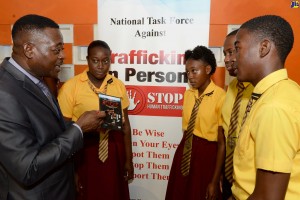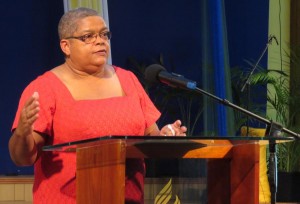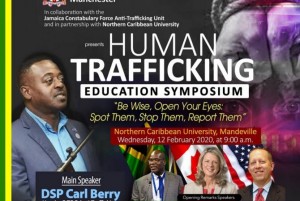
Human Trafficking and the Problem of Public Education
August 3rd, 2020
The issue of human trafficking in Jamaica appears shrouded in mystery. Why is this?
I have not really grasped the dimensions of the issue on our island, to be honest with you. I have to dig around, consciously, to find out the extent of the problem, and what is being done to combat human trafficking.
Is this because the public education effort is inadequate – or perhaps the issue comes low on the list of national priorities? We have so many other critical issues to worry about: crime, health… Oh, but human trafficking falls under both those headings, doesn’t it – not to mention human rights. There are so many issues that are interlinked. But it is true to say that the very nature of human trafficking is often “under the radar” – clandestine, complex, and not quite what it appears on the surface. We have to get beneath the surface.

Head of the Anti-Trafficking in Persons Vice Squad, Deputy Superintendent of Police (DSP) Carl Berry (left), shows students from Port Antonio High School in Portland a copy of the ‘Rescue’ DVD, which is the National Task Force Against Trafficking in Persons documentary on human trafficking. The students are (from second left): Davia Turner, Debra-Kay Williams, Mark Panton, and Rushaun Cousins. They were at the launch of the Anti-Trafficking in Persons Clubs in Schools initiative at Dunoon Technical High School in Kingston.
Photo: Dave Reid/JIS
Now, the U.S. Department of State produces a report annually that “ranks” countries in terms of efforts they are making to combat human trafficking. Jamaica has remained in “Tier Two” for a while. But – so what? Is this ranking any help to us? Does it influence our policy makers, and law enforcement? Several recommendations were made last year, but National Rapporteur on Trafficking in Persons, Diahann Gordon Harrison feels that not enough progress has been made. Ms. Gordon Harrison tabled her report for 2018-2020 in Parliament on April 30, but no doubt we were all too distracted by COVID-19 and other matters to pay much attention. Another formidable Jamaican woman, Mrs. Carol Palmer, was passionate on the topic when serving as Permanent Secretary at the Ministry of Justice; she chaired the National Taskforce Against Trafficking In Persons
An event earlier this year in Mandeville.
I would hate to suggest that human trafficking, which mostly affects women, is seen as one of those “women’s issues” that gets talked about at regular intervals, but no real positive action is taken. Moreover, the public is not engaged, or only a section of the public. Despite the efforts of well-meaning non-governmental organizations and great organizations like UNICEF, public education is not reaching the general public. It is taking place mainly in the schools, and the Anti Trafficking Unit of the Jamaica Constabulary Force (JCF) is doing its best to get the word out; but I suspect there is not enough capacity in this field in the JCF, and that more specialized training is needed. I also wish that discussions could be extended to communities, including “‘Pon di Corner” informal information and Q&A sessions, partnering with community-based organizations.
Currently, we are deeply worried about gang activities and crime; do we know, for example, how many gangs are involved in the trafficking of young girls, to boost their coffers? After all, the human trafficking trade globally generates profits of at least US$150 billion per annum. What are the threads within the society – the webs that our teenagers, in particular, get caught up in? Who is involved? After all, human trafficking is organized crime.
Perhaps the lack of attention to the problem is due to approximately 49 per cent of the population (our men), who feel such matters are none of their business? However, trafficking in persons does not only affect women and girls; there are male victims too, who are not receiving the attention they need. There is no shelter for males, for example.
If (and I say “if” because I am unsure) the problem has been identified, quantified and discussed sufficiently… Let’s see some action. As in the case of crime in general, the public, and civil society, will be right behind our leaders if they make a sincere effort to get the issue on the front burner. Meanwhile, they must inform and arm the public with solid facts. Education!
It’s not enough to tell people that human trafficking is a “very, very serious matter” – without explaining how, and why, and in what ways it might affect you, your child, your family – or your community. The public are not tuned in to speeches at various fora that the media may or may not pick up on. Meanwhile, I wish the JCF unit all the best as they continue to fight “modern day slavery.”
It crossed my mind as I watched the launch of the National Consensus on Crime: speeches are not enough.

Mrs. Carol Palmer was a tremendous advocate on human trafficking as Permanent Secretary in the Ministry of Justice and Chair of the National Taskforce Against Trafficking in Persons.
Tags: Carol Palmer, children, children's rights, Diahann Gordon Harrison, gender-based violence, human rights, human trafficking, Jamaica Constabulary Force, JCF, Ministry of Justice, NGO, organized crime, social media, Spotlight Initiative, training, U.S. Department of State, UNICEF Jamaica, youth at risk
The Gleaner reserves the right not to publish comments that may be deemed libelous, derogatory or indecent.
To respond to The Gleaner please use the feedback form.
One Response to “Human Trafficking and the Problem of Public Education”
- We Are the Zoomers
- Living Online with Humans and Birds: NAOC 2020
- Human Trafficking and the Problem of Public Education
- Down Memory Lane
- Are We Ready to Recover from COVID-19?
- Road Safety Matters: Is Your Vehicle Safe?
- Sexual Harassment, Me Too, and the Minister’s Disturbing Giggle
- The Vulnerable Senior Citizens, Private Care Homes and COVID-19
- A Muddle Over Masks
- Here is Something Life-Saving You Can Do: Give Blood!




[…] and is our public education on the issue working? Read my thoughts in my Gleaner blog post here. Now just this week a man was given a ten-year sentence for “tricking teen girl into […]